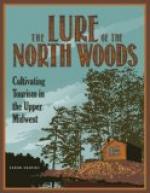When they reached the lake he found there would be some delay. They had covered the canoes with branches, but the pine-needles had withered off and the hot sun had opened the seams. Some of the thin planks were badly split, one had sprung away from its fastenings, and it would take a few days to repair the damage without proper tools. The caulking composition he had brought would not go round, and he had to send the Metis into the bush to look for gum to make the Indian pitch. Then it cost him a day’s hard labor to rough out new plans with an ax and saw, and he afterwards found he must make a steaming-box to soften the wood so that it would bend into place.
On the second night he was tired and disturbed, but his sleep was light and he wakened shortly before daybreak. It was not dark; he could see the trunks behind the camp and Agatha’s white tent. The ripples broke upon the beach with a gentle splash, and there was a faint sighing in the pine-tops. Except for all this all was very quiet, and he wondered whether he had heard a canoe paddle in his dreams. Then, not far off, a stone rattled as if it had been trodden on.
Thirlwell got up quietly and glanced about the camp. The men were asleep. He counted their indistinct figures, wrapped in blankets; nobody was missing. Still somebody had disturbed a loose stone and he moved cautiously into the gloom. One could not creep up to an Indian, but Thirlwell imagined there were none about, and if an Indian had meant to steal something, he would not have crossed the slanting bank strewn with large gravel, from which the noise had come. Thirlwell, himself, would not have done so, for he had learned to be silent, when hunting in the bush. He suspected a clumsy white man, from the cities. When he got near the bank he stopped behind a tree. There was a narrow opening, but he saw nobody and heard nothing except the wind in the pine-tops.
He tried to creep round the opening, but fell among a clump of wild-berry canes. They were green and did not rustle much, but he knew that after this it would be useless to go on with the search. Besides, he was not certain that a man had disturbed the stone. The camp-fire had gone out and an animal might have come down to drink. He grumbled at his awkwardness and going back to camp, went to sleep again.
In the morning he returned to the bank, but found no tracks. He could account for the stone falling in two or three natural ways, but the splash of the paddle was a different thing. Still he had not actually heard the noise, but, so to speak, wakened with its echo in his ears, and sitting down, he pondered the matter. Supposing that somebody from Stormont’s gang had prowled about the camp, it was difficult to see the fellow’s object. Thirlwell did not doubt that Stormont knew he was the leader of Agatha’s party and she could do nothing without his help. If Driscoll had been with his former confederate, one could have understood the thing. Black Steve had an Indian’s cunning and the instincts of a savage animal, but he was dead and Stormont was a rascal of another kind. Steve’s primitive methods would not appeal to him. Thirlwell gave up the puzzle and got about his work.




